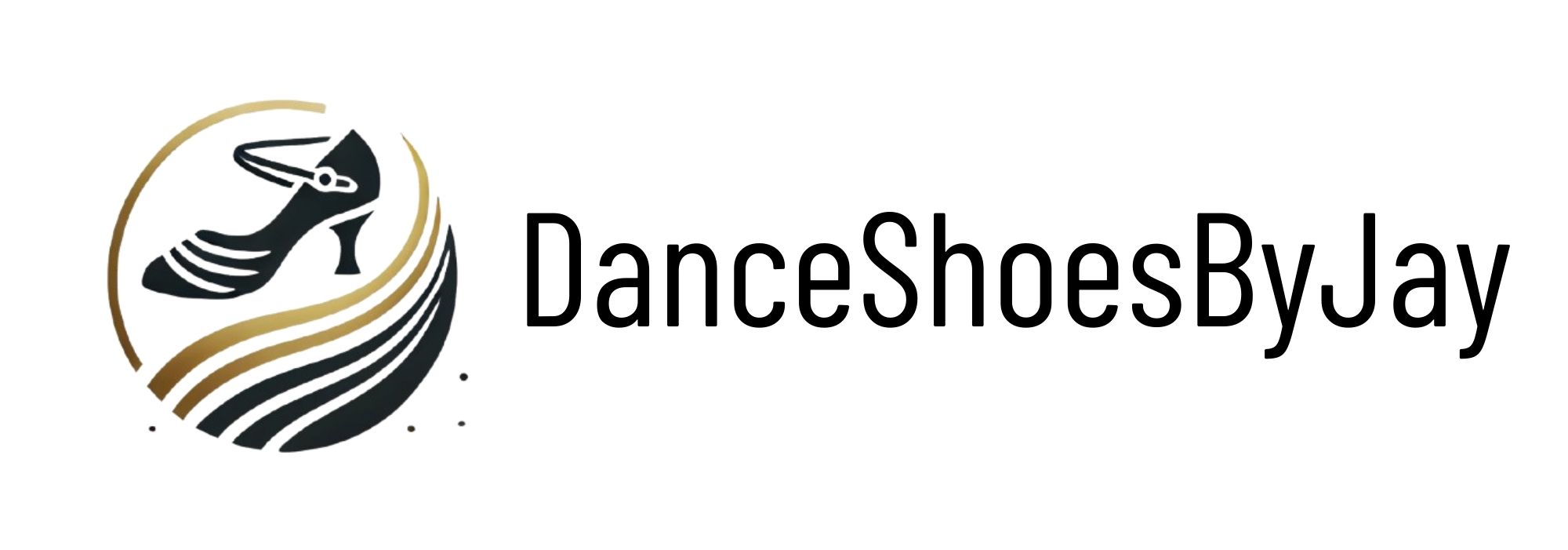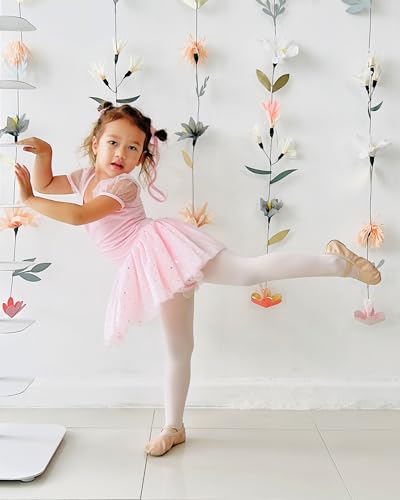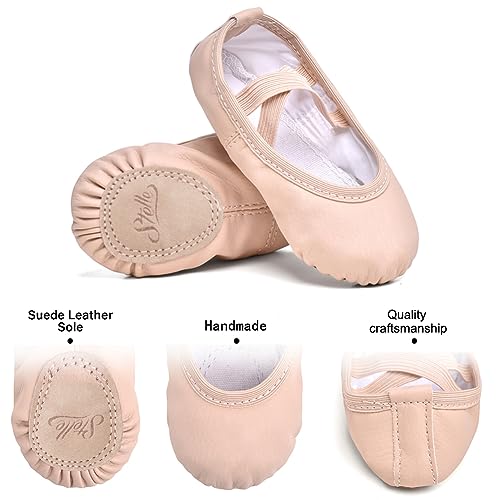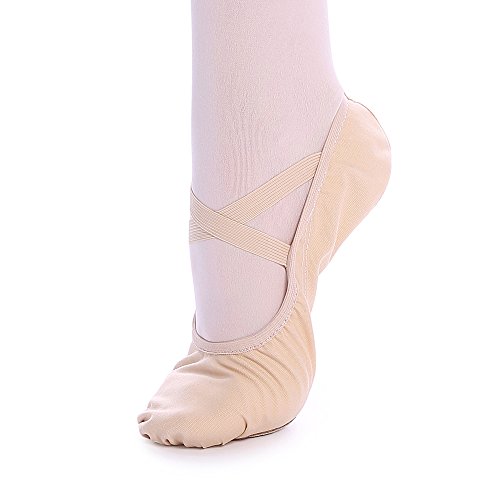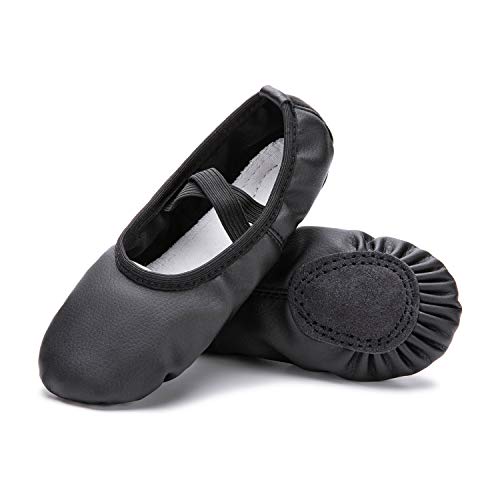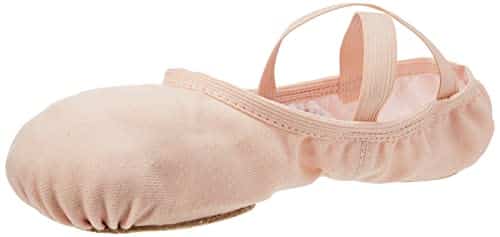When it comes to ballet footwear, the choices can be quite varied, especially when comparing children’s options like Stelle Toddler Ballet Shoes with adult alternatives such as Women’s Ballet Slippers. Understanding the differences in design, functionality, and fit is essential for both parents selecting shoes for their young dancers and adults seeking comfort and style in their own practice. This comparison will explore key factors that distinguish these two categories of ballet shoes, helping you make informed decisions based on your specific needs and preferences.
Dance Practice
The Stelle Ballet Shoes for girls and boys feature a breathable PU upper and a durable suede leather sole, providing excellent support and grip for ballet and gymnastics. Designed for easy cleaning and comfort, these soft leather slippers are perfect for toddlers to big kids.
Dance Practice
These ballet shoes for women and girls feature a durable canvas vamp and non-slip leather sole, ensuring stability and flexibility during dance. Designed with a comfortable cotton lining and insoles, they provide excellent sweat absorption and a snug fit for optimal performance.
Stelle Toddler Ballet Shoes
Material Used
Breathable PU Upper and Suede Leather Sole
Size Availability
Available for Toddlers to Big Kids
Weight
1.6 ounces
Comfort Features
High-quality cotton lining for comfort
Design Purpose
Specifically designed for ballet dance and gymnastics
Women’s Ballet Slippers
Material Used
Canvas Vamp and Non-Slip Leather Sole
Size Availability
Available for Women and Girls
Weight
2.08 ounces
Comfort Features
Cotton lining and insoles to increase comfort and sweat absorption
Design Purpose
Versatile for ballet and yoga
Stelle Toddler Ballet Shoes
Women’s Ballet Slippers
Stelle Toddler Ballet Shoes
Women’s Ballet Slippers
Comparison table


Unique Selling Points (USPs)
Stelle Ballet Shoes for Girls Toddler
- Made from soft leather for increased comfort and durability.
- Suede sole provides better grip on dance floors.
- Designed specifically for toddlers, ensuring a perfect fit for young dancers.
Ballet Shoes for Women Girls
- Lightweight canvas material allows for breathability during extended use.
- Versatile enough for both ballet and yoga activities.
- Available in various sizes to accommodate different foot shapes.
Pros and Cons
Stelle Ballet Shoes for Girls Toddler
Pros:
- Superior comfort due to soft leather.
- Suitable for early dancers and beginners.
- Durable construction for active use.
Cons:
- Limited color options compared to adult sizes.
- Sizes may run smaller, necessitating careful measurement before purchase.
Ballet Shoes for Women Girls
Pros:
- Lightweight and breathable, ideal for warm environments.
- Multi-functional design for various activities.
- Wider size range to cater to diverse foot sizes.
Cons:
- Canvas may not offer the same level of durability as leather.
- Less specialized for ballet, focusing more on versatility.
Use Cases
- Stelle Ballet Shoes for Girls Toddler: Best suited for young children engaged in ballet classes, providing protection and support during dance activities.
- Ballet Shoes for Women Girls: Ideal for adult women or older girls who participate in ballet or yoga, looking for a versatile and comfortable option.
Conclusive Assessment
Based on the comparison, there isn’t a clear overall winner, as each product excels in different areas tailored to specific user needs.
- Stelle Ballet Shoes are superior for toddlers focused on ballet, offering durability and comfort through premium materials.
- Ballet Shoes for Women are the conditional winner for older users who seek versatility and lightweight options for multiple activities.
Final Summary
In summary, the Stelle Ballet Shoes for Girls Toddler are perfect for young dancers looking for comfort and durability in a ballet-specific shoe. On the other hand, the Ballet Shoes for Women offer flexibility for a broader range of activities, making them suitable for both ballet and yoga. Depending on your situation—whether you are purchasing for a young dancer or seeking a multi-purpose shoe—each product has its distinct advantages to cater to specific needs.


Guidelines for Comparing Ballet Shoes
When it comes to selecting the right ballet shoes, several factors must be considered to ensure optimal fit, comfort, and performance. Below are some general guidelines and key factors to keep in mind when comparing products in the ballet shoes category, such as ‘Stelle Toddler Ballet Shoes’ versus ‘Women’s Ballet Slippers’.
1. Shoe Type
Understanding the different types of ballet shoes is essential.
- Pointe Shoes: Designed for advanced dancers, offering support for en pointe work.
- Ballet Slippers: Ideal for beginners and practice, typically made of soft materials.
- Toddler Ballet Shoes: Focused on comfort and ease of wear for young dancers.
2. Material
The material of the shoes can affect durability, comfort, and flexibility.
- Canvas: Lightweight and breathable, easy to clean, good for beginners.
- Leather: More durable and offers better support, but less breathable.
- Satin: Often used for performance shoes, provides a beautiful finish but may not be as durable.
3. Fit and Sizing
A proper fit is crucial for comfort and performance.
- Width Options: Look for shoes available in various widths (narrow, regular, wide).
- Sizing Charts: Always refer to the brand’s sizing guide, as sizes may vary.
- Adjustability: Consider shoes with adjustable straps or elastic bands for a better fit.
4. Sole Type
The type of sole can significantly impact a dancer’s performance.
- Full Sole: Offers more support and is ideal for beginners.
- Split Sole: Provides greater flexibility and allows for better pointe work.
- Thick Sole: Offers extra cushioning but may reduce the feeling of the floor.
5. Purpose and Usage
Consider the intended use of the ballet shoes.
- Practice vs. Performance: Shoes for rehearsal may differ from those meant for stage.
- Age Appropriateness: Ensure the shoe design aligns with the dancer’s age and skill level.
6. Comfort and Padding
Comfort is paramount in ballet footwear.
- Cushioning: Look for shoes with adequate padding for shock absorption.
- Breathability: Materials that allow airflow can enhance comfort during long practices.
- Arch Support: Some shoes offer built-in arch support, which is beneficial for foot health.
7. Price Point
Price can vary greatly among ballet shoes based on brand, material, and features.
- Budget Options: Suitable for beginners or casual dancers.
- Mid-Range: Offers a balance between quality and price, suitable for regular use.
- Premium Choices: Often crafted from high-quality materials for serious dancers.
Everything You Need to Know About Ballet Shoes
The key differences between toddler ballet shoes and women’s ballet slippers primarily revolve around design, size, materials, and intended use.
- Size and Fit: Toddler ballet shoes, such as the Stelle Ballet Shoes for girls, are designed to accommodate the smaller feet of young children, typically ranging from sizes for toddlers to big kids. In contrast, women’s ballet slippers are made for adult sizes and cater to a wider range of foot shapes and sizes.
- Construction and Support: Toddler ballet shoes often feature softer materials and a more flexible construction to support the developing feet of young dancers. For example, Stelle’s soft leather shoes provide comfort and flexibility. Women’s ballet slippers, like the canvas ballet shoes, may have additional support features and sturdier construction to suit the demands of adult ballet practice and performance.
- Materials: The materials used in toddler ballet shoes are often softer and more forgiving to accommodate growing feet. In contrast, women’s ballet slippers can be made from various materials, including canvas, leather, or synthetic options, which may offer different levels of durability and breathability.
- Design Features: Toddler ballet shoes typically have simpler designs with fewer embellishments, focusing on functionality and fit. Women’s ballet slippers may include more style options, such as different colors, patterns, and design elements, reflecting personal taste and fashion trends.
- Intended Use: While both types of shoes are designed for ballet, toddler shoes are often meant for introductory classes or recreational dancing, whereas women’s ballet slippers are designed for more serious practice or performance, providing the necessary features for adult ballet techniques.
In summary, when choosing between toddler ballet shoes and women’s ballet slippers, consider the differences in size, construction, materials, design features, and intended use to find the most suitable option for your needs.
